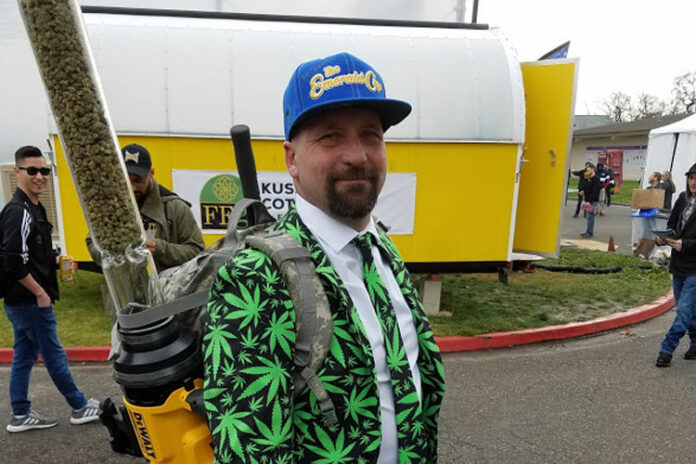Annual event mixes serious trade talk with playful vibes
Having a green thumb took on an added layer of meaning at this year’s Emerald Cup.
The event, held at the Sonoma County Fairgrounds Saturday and Sunday, Dec. 15 and 16, covered the gamut of cannabis. It culminated in the cup awards ceremony, which saw music icon and cannabis activist Willie Nelson accept the first annual achievement award named in his honor.
“You have to do it right,” said Emerald Cup founder Tim Blake in reference to the quality and rules of the 15th annual festival.
Blake, along with daughter Taylor Blake, gave the top award in the Licensed Sungrown category to Ridgeline Farms for the cultivar Green Lantern. The event focused on sungrown cannabis and this has traditionally been the most sought-after trophy.
The work of regenerative farmers was also recognized and was the focus of many of the growers and dispensaries present.
Green tape
Starting a farm locally where cannabis can reach these levels is a challenge before the first plant sprouts.
Blake spoke at a lecture titled Equity, Inclusion and Growing a Global Industry at the fairgrounds’ Finley Hall with a panel of experts. He expressed concern for the small business farmer and the ability to get through regulatory processes but saw positive change in certain areas for the industry.
“It’s amazing what a few people going to (local government) meetings can accomplish,” he said.
One of his personal solutions to creating regulations that agree with prospective small farmers was to weed out the politicians who still saw cannabis as taboo.
This was the first cup to be held in a recreational legal California, and he jokingly noted at the awards ceremony that it “was easier being an outlaw” compared to the hurdles of putting on the festival, which had few restrictions on use.
In a different conversation, Terry Garrett weighed in on the issue in Sonoma County specifically. Garrett is a board member of Sonoma County Economic Development Board and also on the county’s Cannabis Task Force.
“Land use policy is the biggest issue. Cannabis doesn’t have ‘right to farm’ status, which means push back from cannabis opponents is more effective than if cannabis was a protected crop like others,” he said.
Bans of cannabis land use by the county have forced prospective farmers to look elsewhere, such as Humboldt and Mendocino counties, he said. It also displaced “most of the farmers and prevented them from entering the legal market.”
This is not good for the county’s tourism, he said, as he believes cannabis farming supplements the wine and recreation opportunities the county is known for.
Some challenges going forward for the cannabis economy as a whole will be transitioning to a legal, state-only market, which is three-to-four times smaller, he said.
“Metaphorically, that’s like blocking all the exits and setting the building on fire,” he said.
Farm to preroll
Eli Melrod, owner of Solful dispensary in Sebastopol, said he would like to buy from as many local farmers as possible, but they are difficult to find. He did find one farm in particular, though, that his business has done well with.
Craig Johnson owns Alpenglow Farms in Humboldt County. Johnson is one of the farmers practicing regenerative farming. He grows several other crops in conjunction with his cannabis to enhance the soil and he believes the long-term effects will help slow global warming effects if taken up en masse. He said it helps having a direct voice to the community through Solful to emphasize the practice’s importance.
Johnson and Melrod were united in their vision for the industry’s future and the growth of small business in the area. Melrod has invested in his hometown and Johnson said he hopes to one day give his farm over to his daughters. Both said they were excited to be a part of the evolution of the business.
Melrod said being in the city limits has kept him from dealing with county regulations. He described the city’s process of opening a dispensary rigorous but well done.
To begin with, he needed a conditional use permit and an amendment to the city code. During that approval, there was a thorough vetting process that took four hours at one hearing. He wasn’t frustrated by it, though.
“Sebastopol is at the forefront of how cannabis should be regulated,” he said.
Before applying for the permit, he went to his business neighbors and explained what he wanted to do. He had six of nine owners in the center sign a letter on his behalf when he went in front of the council.
He said his business has helped revitalize the center. Not only has the new product brought in a new demographic of customer, he has helped efforts with security in the area that has led to several theft arrests.
He and his company also hold education talks for the community. The next one he said will be in January at the Sebastopol Community Center covering bio-dynamic cannabis.
Joy of joints
The festival wouldn’t be labeled such if it was all business, though. Awareness talks and shopping blended with entertainment in several varieties.
Musical acts ranged from reggae to punk and as the music faded further from stage, speakers kept classic cannabis hits playing through the walkways. Golgol Bordello topped off Saturday night, while Big Gigantic closed out the event Sunday.
Comedy duo Jason Mewes and Kevin Smith, aka Jay and Silent Bob, held a podcast and got the crowd into their act. Comedian Doug Benson was also a draw for many of the attendees, and he co-opened the awards with Ngaio Bealum.
And if big events didn’t suit your mellow, there were free video games, lounges and art to appreciate, too.
Thousands arrived to the Emerald Cup for many reasons, and the influence of cannabis culture in the mainstream was apparent.









